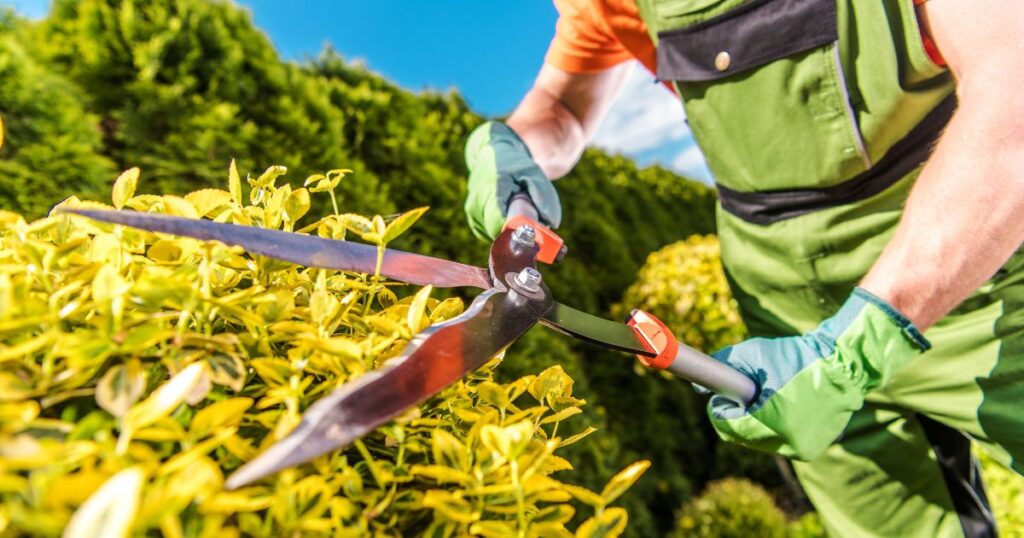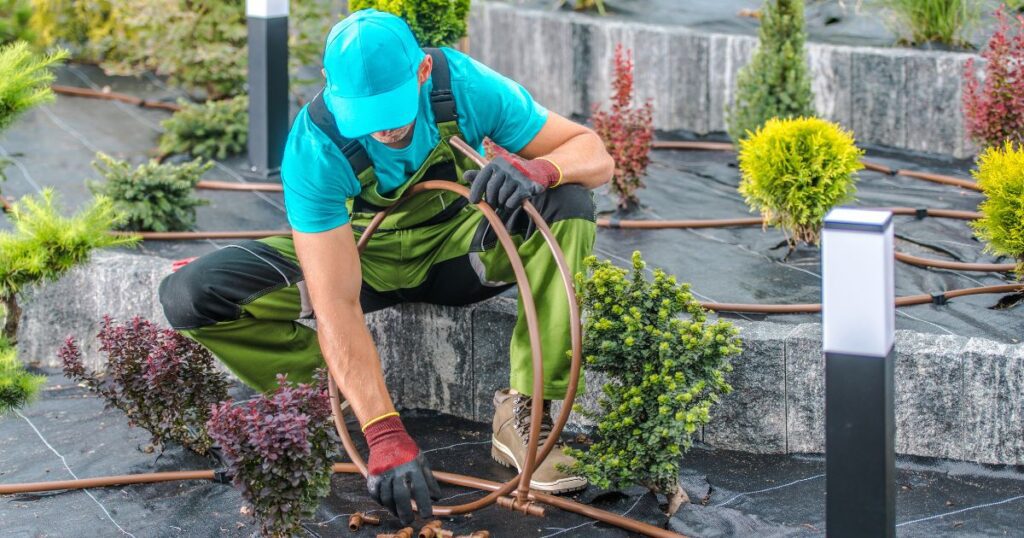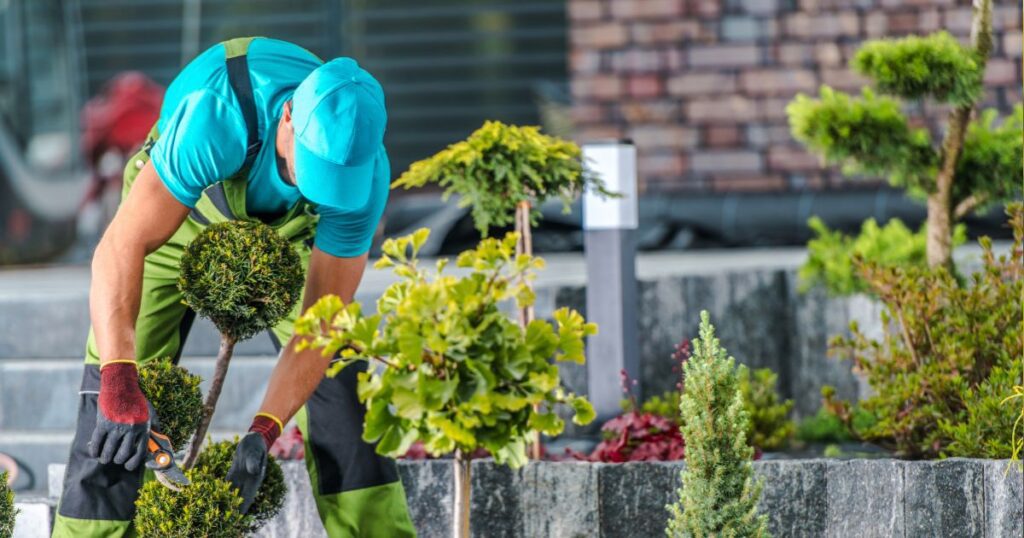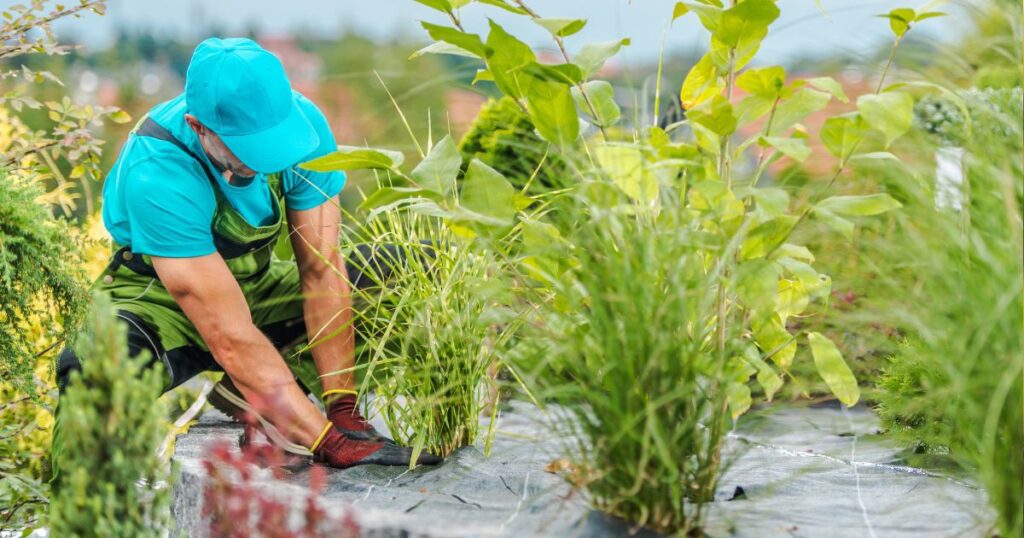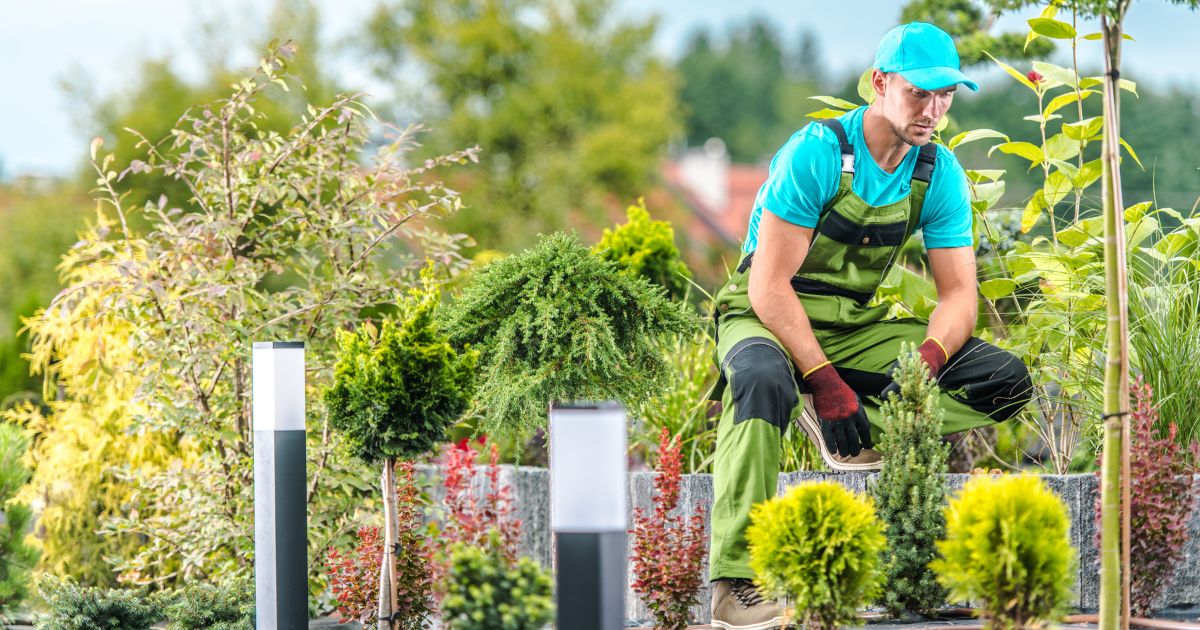
Introduction
Attention all nature enthusiasts and aspiring garden gurus! Are you ready to unlock the secrets of the green-thumb trade and dive headfirst into the world of professional landscaping? How to become a professional landscaper? Well, get your gardening gloves ready and prepare for an exhilarating journey of discovery. In this whimsical guide, we’ll unveil the mystical steps and trade secrets on how to become a bona fide professional landscaper. From nurturing plants to sculpting breathtaking landscapes, we have a treasure trove of knowledge waiting just for you. So, get ready to plant the seeds of your dreams and let’s embark on this green adventure together!
To become a professional landscaper, you can start by gaining practical experience through working for landscaping companies or participating in apprenticeship programs. Additionally, pursuing relevant education or certifications in landscaping or horticulture can enhance your skills and credibility. Building a strong portfolio of your work and establishing a network within the industry can also help you establish yourself as a professional landscaper.
Definition of Professional Landscaper
A professional landscaper is an individual who has undergone formal education or training in horticulture, landscaping design or related fields. They are skilled in different aspects of landscaping, including design principles like color schemes, plant selection based on location and climate suitability as well as maintenance practices. Professional landscapers are knowledgeable about environmental impact by utilizing sustainable materials when creating designs.
RELATED: How to Fire Your Landscaper: A Guide to Firing Your Landscaper with Grace and Confidence
Importance of Landscaping in the Modern World
Landscaping plays a significant role in shaping our world; it helps to create beautiful surroundings that provide a variety of benefits such as mitigating soil erosion through planting grasses or trees. People living in urban areas can experience nature’s beauty through city parks or urban gardens designed by professional landscapers. Furthermore, professionally designed landscapes can improve air quality by reducing volatile organic compounds (VOCs) which have been linked to respiratory illnesses.
The importance of landscaping goes beyond aesthetics; it has been proven that green spaces help reduce stress levels among people living in cities. In addition to improving our mental health, greenery also increases physical activity since more people will be encouraged to walk outdoors if there are well-maintained paths or trails surrounded by beautiful landscapes.
Benefits of Becoming a Professional Landscaper
- Becoming a professional landscaper offers numerous benefits, both personal and professional. Firstly, it provides an opportunity to turn your passion for nature and design into a fulfilling career. Additionally, the demand for professional landscapers is continually increasing as people seek to improve their outdoor spaces.
- Professional landscaping offers job security and financial stability as well. Many professional landscapers are self-employed business owners who set their schedules and control their income.
- The nature of the work is also active, providing a healthy lifestyle through consistent physical activity. Moreover, there is always room for professional growth in landscaping; individuals can continue learning about new techniques, trends, or technological advancements such as automated watering systems or solar-powered garden lights.
- With creativity and innovation becoming more sought after in the field of outdoor design, a career as a professional landscaper can be both challenging and rewarding. Landscaping has significant importance in shaping our world; it creates beautiful surroundings while offering numerous benefits such as stress reduction and improved air quality.
- Becoming a professional landscaper allows individuals to turn their passion into a fulfilling career while providing job security and financial stability. The next sections will explore the education/training necessary for becoming a professional landscaper, skills required as well as tools/equipment needed to succeed in this field.
Education and Training
Formal Education in Horticulture, Landscaping, or Related Fields
A professional landscaper must possess knowledge of plants and their growth habits, soil types and conditions, climate requirements, and design principles. Formal education in horticulture, landscaping, or related fields is the foundation of this knowledge.
Many universities, colleges, or technical schools offer programs in horticulture and landscape design that include courses in plant identification, plant propagation techniques, soil science, irrigation systems, and landscape design principles. Courses are often available online for students who cannot attend classes on campus.
A degree program in horticulture allows students to take courses in various cultivation methods of plants, such as hydroponics or aquaponics, that can be used to enhance their skills as professional landscapers. Certification programs like Certified Horticulturist (CH) by the American Society for Horticultural Science (ASHS) help individuals gain credibility within the industry.
Apprenticeships and Internships with Experienced Landscapers
An apprenticeship program is a paid training program where an individual works under the supervision of an experienced landscaper to learn hands-on techniques used by professionals. This is an excellent way for individuals who prefer not to take formal education or want more real-world experience before starting their own business.
Internships are another way to gain experience working alongside professionals without being committed full-time. Internships provide a chance for participants to work on actual projects with clients while learning from experienced professionals who can provide guidance on how best to tackle different situations.
Continuing Education and Professional Development Opportunities
Landscaping trends change continuously with new designs coming up every day; hence it’s important for professional landscapers to keep up-to-date with these new developments through continuing education programs. These programs help them hone their skills further; they can also learn new techniques and methods that can enhance their services to clients. Professional development opportunities such as seminars or workshops are also critical for professional landscapers.
These events offer a chance to network with other professionals in the industry and learn about emerging trends or innovative ideas. Additionally, membership in professional organizations such as the Association of Professional Landscapers (APL) or the National Association of Landscape Professionals (NALP) provides valuable resources for continued education and networking.
Skills and Qualities
Becoming a professional landscaper requires skills and qualities that will set you apart from the rest. These include having extensive knowledge of plants, soils, climate, and design principles. Additionally, creativity and the ability to visualize designs are also essential traits for a successful professional landscaper.
Knowledge of Plants, Soils, Climate, and Design Principles
As a professional landscaper, it’s important to have an understanding of the local climate and soil conditions in order to choose the right plants that will thrive in a specific area. Thorough knowledge of plant species is also critical when creating landscape designs. Understanding how different plants grow together is vital for creating visually stunning outdoor spaces that are both functional and practical.
Design principles such as color theory and spatial relationships play an important role in creating a cohesive design. As a landscaper, you should be familiar with these concepts in order to create landscapes that are not only beautiful but also functional.
Creativity and Ability to Visualize Designs
Another important quality for professional landscapers is creativity. Great landscapers can take an uninspiring plot of land or yard space and transform it into something beautiful that meets their client’s needs perfectly.
The ability to visualize designs is another important trait for any aspiring landscape designer. Being able to see what could be instead of what currently exists allows for proper planning before implementing changes.
Physical Fitness and Stamina for Outdoor Work
Landscaping work involves physical labor, such as lifting heavy equipment or digging holes which requires physical fitness. In addition, landscaping often involves long hours outside in varying weather conditions which require stamina over time. It’s crucial that any aspiring landscaper possess these qualities so they can endure physically challenging tasks while staying alert during long work hours under changing weather conditions.
Attention to Detail and Ability to Follow Instructions
Attention to detail and the ability to follow instructions are also important when working as a professional landscaper. To provide high-quality work, attention to detail is crucial, ensuring every aspect of a project is completed with the utmost precision.
In addition, the ability to follow instructions is critical for any landscaping project. Every client has specific requirements that need to be met, so following instructions precisely while still maintaining creativity requires a balance between the two.
To become a professional landscaper, one must develop these skills and qualities which are important for success in this field. Knowledge of plants, soils, climate, and design principles provides the foundation for any successful landscape design. Creativity and visualization skills enable designers to create unique landscape designs that meet their client’s requirements perfectly.
Physical fitness and stamina are necessary for enduring long hours outside in varying weather conditions, while attention to detail and following instructions ensure that every project is completed with precision. By honing these skills and qualities, you can establish yourself as a professional landscaper who produces high-quality work that meets clients’ expectations.
Tools and Equipment
Basic Hand Tools
To become a professional landscaper, you’ll need to have a basic set of hand tools that will help you maintain and design outdoor spaces. Some of these tools include shovels, rakes, pruners, trowels, hand cultivators, and hoes.
These tools are essential for digging soil, removing weeds, pruning trees and plants, and planting new foliage. When buying hand tools for landscaping work, consider the ergonomics and quality of the materials.
Comfortable handles on shovels or rakes can reduce strain on your hands when working for extended periods. High-quality steel blades on pruners or shears will remain sharp longer than cheaper alternatives.
Power Tools
Power tools play an important role in modern landscaping practices. They make it easier to maintain large properties or tackle heavy-duty projects that would be too difficult with manual labor alone. Some power tools that every professional landscaper should have in their arsenal include mowers, trimmers (or edgers), blowers (or vacuums), and chainsaws.
When choosing power tools for landscaping work, think about the level of power needed to complete tasks quickly without damaging lawns or garden beds. You should also consider fuel types – electric models are more eco-friendly but may not have enough power to handle large jobs compared to gas-powered alternatives.
Specialized Equipment
Specialized equipment such as tillers or excavators is necessary when dealing with larger projects like constructing water features or terrace gardens. Tillers help in preparing the soil, while excavators are great for moving earth – both allowing professionals to complete jobs faster with less strain compared to using manual labor alone. Consider renting specialized equipment instead of buying it outright if you’ll only use it occasionally since they can be costly investments upfront.
When renting equipment, make sure to check for damage and safety features before use. Keep in mind that improper use of specialized equipment can lead to costly mistakes and accidents.
Protective Gear
As a professional landscaper, you may also need protective gear such as gloves, safety glasses, ear protection, and hard hats when operating power tools or specialized equipment. Gloves protect hands from cuts or blisters, while ear protection reduces noise-induced hearing loss caused by lawnmowers or other loud machinery. Safety glasses protect eyes from flying debris while working with power tools.
When choosing protective gear, ensure that they meet local safety regulations and are comfortable to wear for long periods. Also, replace any damaged or worn-out gear promptly.
Maintenance
Maintaining your tools and equipment is essential for their longevity and optimal performance – this includes keeping them clean after each use, sharpening blades as needed, lubricating moving parts regularly (such as chains on chainsaws), replacing worn-out parts promptly (like spark plugs on gas-powered engines). Proper maintenance not only extends the life of your tools but also ensures they operate safely when used in the field. Having the right tools is essential for becoming a professional landscaper.
Procure high-quality basic hand tools alongside power tools like mowers or blowers – specialized equipment such as tillers will help accomplish more extensive projects faster without manual labor alone. Protective gears should be worn when operating power tools and equipment to reduce injury risk, while proper maintenance ensures optimal performance over time.
Business Operations
Legal Requirements for Operating a Landscaping Business
One of the first things to consider when starting a landscaping business is the legal requirements. It is important to register your business with the appropriate government agencies and obtain any necessary permits or licenses.
This can vary by state and locality, so it is important to research the specific requirements in your area. In addition, you will need to obtain insurance to protect your business from liability.
This typically includes general liability insurance as well as workers’ compensation insurance if you plan on hiring employees. It may also be beneficial to consult with a lawyer or accountant who specializes in small business law to ensure that all legal requirements are met.
Marketing Strategies for Attracting Clients
Marketing is an essential component of any successful landscaping business. One effective strategy is to create a professional website that showcases your services and previous projects. You can also use social media platforms such as Facebook or Instagram to showcase your work and interact with potential clients.
Another effective marketing strategy is networking within your local community. Attend local events such as home and garden shows or volunteer at community events where you can meet potential clients in person.
You can also consider offering referral incentives to current clients who refer new customers. It’s important to remember that word-of-mouth marketing can be very powerful, so always provide high-quality service and go above and beyond for each client.
Accounting Practices for Managing Finances
Effective financial management is critical for success in any small business, including landscaping. One key practice is keeping accurate records of income and expenses using accounting software such as QuickBooks or Xero. It’s also important to create a budget that takes into account all expenses, including equipment purchases, vehicle maintenance, and employee salaries, if applicable.
Regularly reviewing financial statements will help you make informed decisions about how best to allocate resources and grow your business. In addition, consider working with a financial advisor or accountant who can provide guidance on tax planning, cash flow management, and other financial issues.
Working with Clients
Communication Skills for Understanding Client Needs
Effective communication is essential for building strong relationships with clients and understanding their needs. This starts with active listening and asking questions to clarify what the client wants from their landscaping project. It’s also important to communicate clearly about the scope of work, timeline, and budget for the project.
Provide regular updates throughout the project to keep clients informed about progress and any changes that may arise. Be open to feedback from clients and be willing to make changes if necessary to ensure their satisfaction.
Ability to Provide Estimates Based on Client Budgets
Providing accurate estimates is critical for ensuring that both you and your client are on the same page when it comes to the cost of a project. When creating an estimate, take into account all expenses, including labor, materials, equipment rental or purchase costs, etc.
It’s also important to ask clients about their budget upfront so that you can create a realistic estimate that meets their needs. Be transparent about any additional costs that may arise during the course of a project so that there are no surprises later on.
Flexibility in Adapting Designs Based on Client Feedback
Even with careful planning and communication upfront, it’s not uncommon for clients to change their minds or request modifications throughout a landscaping project. It’s important to remain flexible in these situations while still maintaining clear boundaries around what is feasible based on time constraints or budget limitations.
One effective strategy is to present multiple design options upfront so that clients have more control over the final outcome of their project. Regularly checking in with clients throughout the process will also help identify potential issues early on so they can be addressed before they escalate.
Working with Clients
Communication skills for understanding client needs
One of the most important aspects of being a professional landscaper is the ability to understand and interpret client needs. Good communication skills are paramount to this. It is important that you take time to listen and understand what the client wants before making any recommendations or assessments.
You can ask open-ended questions to get a better understanding of their vision and expectations. Once you have determined what the client wants, it is important to communicate how you plan on achieving their vision.
Use clear language that explains exactly what you will be doing, why it’s necessary, and how it will impact their landscape. Make sure they understand what you’re suggesting by using sketches or photographs, if possible.
Ability to provide estimates based on client budgets
Clients have different budgets for landscaping projects, so it’s important that, as a professional landscaper, you have the ability to provide accurate estimates based on their budget constraints. This requires understanding not only the scope of work but also material costs, labor costs, and other expenses associated with a project.
Keep in mind that there may be unexpected costs that arise throughout the project, so always plan for contingencies in your budget. It’s also crucial that clients are aware of all expected costs upfront to ensure no unexpected surprises at later stages of the project.
Flexibility in adapting designs based on client feedback
While good communication skills are essential when working with clients, being flexible and adaptable is equally important when trying to meet clients’ needs. Designs may need changing or adjustments due to varying factors such as available space or changes in budget constraints.
Be open-minded when working with clients and take into consideration their feedback and opinions about design aesthetics, even if they may not have an expert eye like yours. When modifications are requested, make sure they remain within a manageable scope both from a cost and time perspective.
RELATED: What is Landscaper? Understanding the Importance of Landscaping
Frequently Asked Questions
What degree is best for a Landscaper?
There is no specific degree required to become a landscaper, but obtaining a degree in landscape architecture, horticulture, or a related field can provide valuable knowledge and skills.
What skills are needed for Landscaper?
Some essential skills for a landscaper include knowledge of plants and landscaping techniques, proficiency in using landscaping tools and equipment, and strong problem-solving and communication skills.
What is the highest paid Landscaper?
The highest-paid landscapers often have advanced experience, certifications, or specialization in areas like landscape architecture, design, or project management.
What is the working environment for a Landscaper?
The working environment for a landscaper can vary, but it typically involves working outdoors in various weather conditions, performing tasks such as planting, pruning, mowing, and maintaining landscapes.
What are the three major career fields in the landscape profession?
The three major career fields in the landscape profession are landscape design, landscape construction and installation, and landscape maintenance and management.
What is the fastest growing profession in the landscaping industry today?
The fastest-growing profession in the landscaping industry today is landscape architecture, which involves the design and planning of outdoor spaces, including parks, gardens, and residential or commercial landscapes.
Conclusion
Becoming a professional landscaper requires considerable knowledge, training, creativity, and hard work. It is a rewarding career that offers endless opportunities for growth and development. To become successful in this career, you must develop excellent communication skills to understand your client’s needs and provide accurate estimates based on their budgets.
Flexibility plays an essential role in satisfying clients’ needs while at the same time being pragmatic in terms of cost and time limitations. With dedication towards your craft and willingness to learn new techniques, you can become an exceptional professional landscaper that clients will depend on for their dream projects.
RESOURCE: Texas A&M AgriLife Extension – Dallas County

